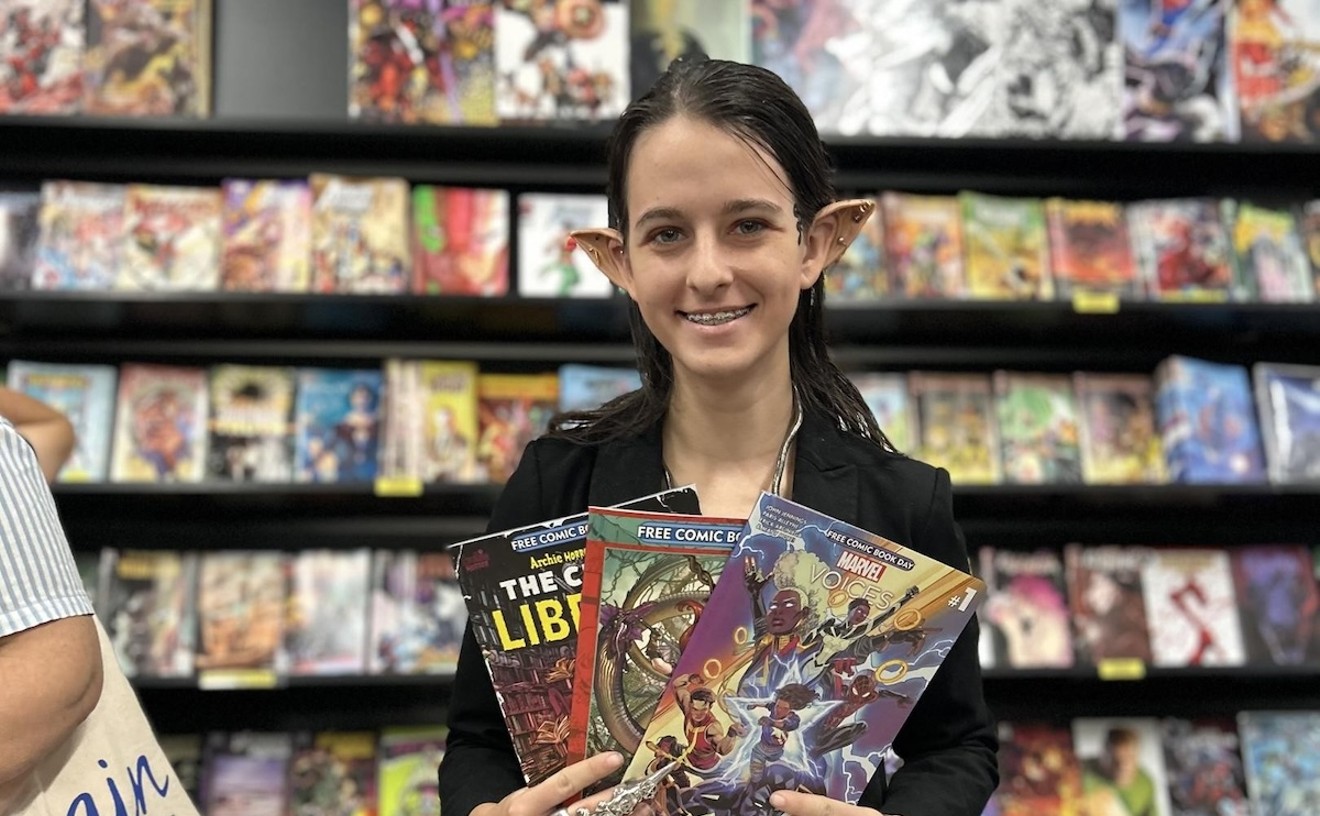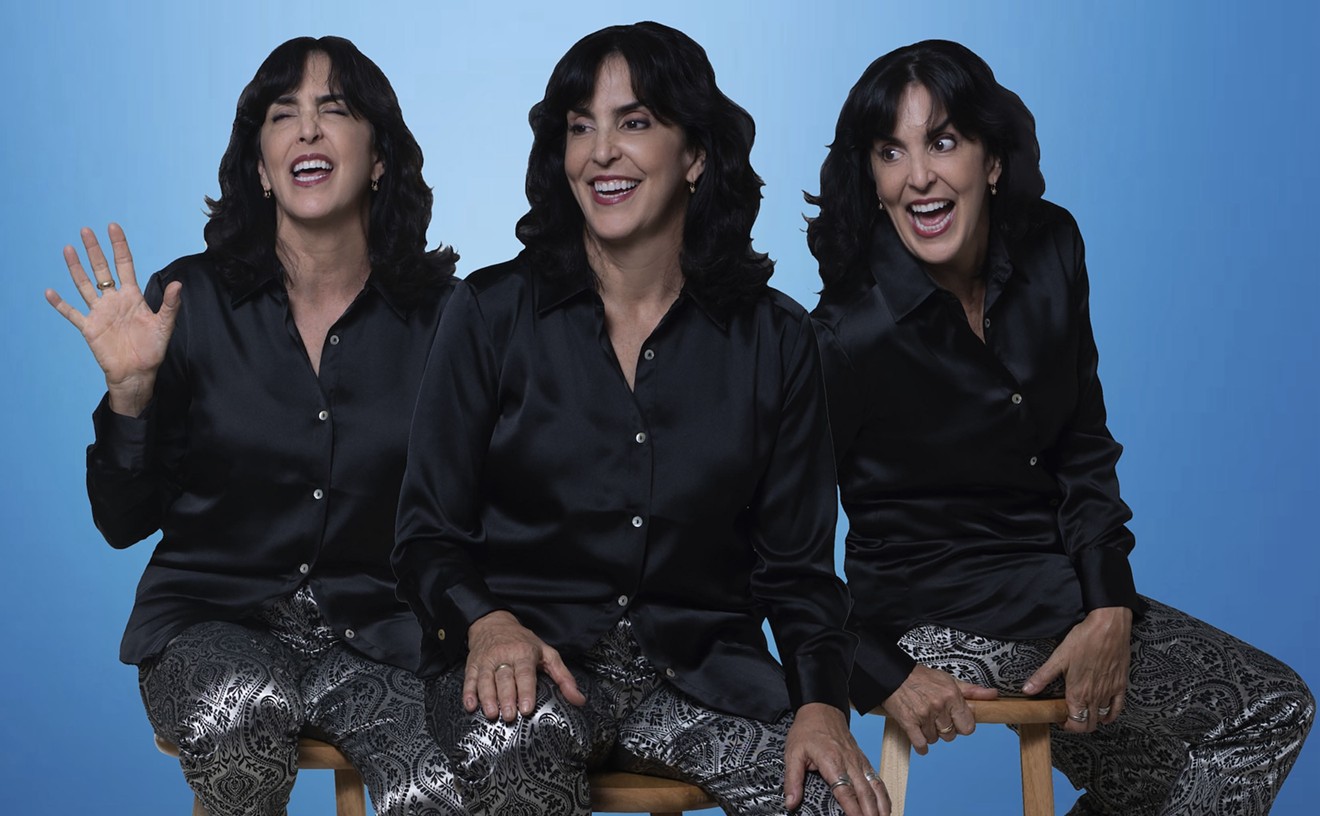Consider the perfection of this division. The Party of God, according to Vidal, stands against most issues (anti-gay, anti-women, anti-abortion, anti-black), believes in witchcraft and other medieval superstitions like flying virgins, and isbest personified by Dan Quayle, Pat Robertson, and Pat Buchanan. Drafting legislation directly influenced by Judeo-Christian "values," POGs undermine all personal liberties, all separation of Church and State -- inalienable rights given by the Republic's founding fathers. Thomas Jefferson avoided religious dogma like the plague.
In the other corner stands The Party of Man, ready to evolve but still unsure, often terrified, espousing positive beliefs (pro-choice, pro-environment, pro-taxes), best represented by the Zen Buddhist Jerry Brown or the bevy of new female politicians. POGs cling to religion; POMs seek solutions. Instead of reciting a toneless Lord's Prayer each Sunday, POMs would rather be fair to friends and neighbors, and refrain from judgment.
Since Vidal clarified my own theories, you can imagine how thrilled I was to find a show in my playground dealing with the same subject, more acute today than ten years ago when the play was written. Anyone with a heart and any gray matter remaining should attend New Theatre's production of Athol Fugard's The Road to Mecca. First seen by this reviewer in New York, featuring Fugard as actor, the play immediately struck the "work of genius" chord. Although the acting in this production doesn't do justice to Fugard's playwrighting, all other elements -- direction, set design, new age background music, lighting, and, of course, the text -- make it a theatrical trip worth taking; one that, hopefully, will inspire some thought.
A lesser-known luminary, Fugard has been working in the theater as playwright, director, and actor since the mid-Fifties in his native South Africa, England, and the United States. Raised in the rigid, rancid atmosphere of apartheid, the writer concerns himself with racism, personal liberty, and censorship. In Mecca, these themes weave together through the deceptively slight tale of an old woman who builds pagan statues because she's finally found God -- and found Him living as far from The Church as possible.
Set in an isolated, arid, and feudal region of South Africa called the Karoo, the play examines one night in the lives of three unique characters. Helen Martins, somewhere in her eighties, occupies a house of light, candles, and white walls, with a menagerie of cement and colored glass statues filling her back yard -- the great work of her life. Previously a meek servant/wife and church-going Afrikaner, on the night of her husband's death she experiences a revelation and turns into a recluse/sculptor, a combo that threatens the Bible-Belting town of New Bethesda.
Using such excuses as her arthritic fingers and failing eyes, the village POGs want Helen shipped to an old-age home and her strange sculpted figures under the wrecking ball. The thought that a POG could suddenly transform into a POM makes them very nervous, and envious.
The agent of her potential destruction comes in the form of an old friend and secret admirer -- the pastor of the town, Marius Byleveld. A widower as well, his bereavement led him to the pulpit, where he spouts hellfire and damnation and personally believes in racial inequality. To Marius, important issues are Helen's date of confirmation and her husband's middle name; to Helen, illumination and freedom of expression are at stake. In his own way, Marius even loves Helen, but unfortunately he's too entrenched in the party line to break free.
Frantic but also weary, Helen sends a last-minute S.O.S. to a gutsy young female friend, an English teacher from Capetown named Elsa. Self-righteously liberal and breathing fire, this POM drives 800 miles to Miss Helen's side, to fight the good fight against repressive forces. Like God and the Devil struggling over possession of an old female Job, Elsa and Marius spend the long night engaged in a tug of war with Miss Helen's soul.
As you can tell, Fugard is not a stupid man. And director Richard Janaro, another scholar, seamlessly stages the magnum opus, producing a vision worthy of the work. Set design by Stuart Brown turns New Theatre from a black box into a white one; even the floor is made of fine sand. A simple but potent magic inhabits Janaro's and Brown's panorama.
Unfortunately, aside from Bill Yule as Marius -- who masters an Afrikaner accent (an odd blend of Dutch, German, and English) and performs with the same quiet menace Fugard brought to the part in New York -- the lead actresses struggle through roles they don't quite grasp. Both Kathy Byrne as Elsa and Sarah Lee as Helen should exude inner strength, but instead they moan, shriek, bellow, and generally try to force out power instead of embodying it. At the same time, neither becomes so terrible that they stand in the way, and when calm is restored, they actually listen to each other and connect. If the ladies could find a quiet power within themselves instead of imitating it, the show would improve -- a lot.
In scenes reminiscent of the recent Republican convention, Marius seeks to imprison Helen because of his "Christian conscience," which easily rhymes with "family values." When Marius accuses Helen of "idolatry" because she sculpts owls and Buddhist totems instead of Christian angels, one recalls Pat Robertson tearing apart the Equal Rights Amendment because it "encourages women to leave their husbands, kill their children, practice witchcraft, destroy capitalism, and become lesbians."
Obviously, the Party of Man needs to act, and act quickly. Bravo to New Theatre for finding the right work at the right time and for the courage to present it. "We don't persecute harmless old ladies," Marius snipes. "No, you don't," agrees Elsa, "but how about the ones who aren't harmless?"
THE ROAD TO MECCA by Athol Fugard, directed by Richard Janaro; with Sarah Lee, Kathryn Byrne, and Bill Yule. At New Theatre, 65 Almeria Ave, Coral Gables, through October 18. Performances Thursday-Saturday 8:00 p.m., Sunday 5:00 p.m. Tickets cost $12.50-$15; free to U.S. Armed Forces, National Guard, Police and Fire Depts, FPL, Red Cross, and other hurricane relief personnel with proper ID. Call 443-5909.
STAGE NOTES
If one supposedly grows younger traveling faster than the speed of light, then I suppose it makes sense that The Speed of Darkness -- as written by Steve Tesich and produced by the Ensemble Stage -- could turn anyone into a centenarian from Ecuador. Understand that playwright Tesich, sreenwriter of Breaking Away and Eleni (so-so films) also turned one of literature's finest contemporary novels, The World According to Garp by John Irving, into one of the worst film scripts conceivable on this or any other planet. Tesich errs here once again, with TV Movie of the Week fare that insults the integrity of theater, as he combines pseudo-ecological statements with post-Vietnam angst, a plea for the homeless, and thin religious symbolism. You can just hear this hack licking his lips and promising himself to write the great American play.
As far as the production, David Caprita of Love 94 builds the only true character, Lou, a homeless philosopher-veteran, but then again, it's the only role to which Tesich lent any depth and a few good lines. Scott Genn as Eddie and Shea Colbert as Mary (maybe Marcie -- the cast can't decide which is her name) imitate life but without energy; however, that's a blessing next to Kerry Sensenbach and Kim St. Leon as the dysfunctional mom and dad, whose characters steadily strain credibility and whose acting skills need a whole lotta work.
In the plot implausibilities abound. One example: Joe, a veteran turned town hero, sprayed extensively with Agent Orange in 'Nam, returns home to South Dakota and takes revenge on American society by dumping nuclear waste into the ground for five years, sans protective suit. Quite some time later, all this dude suffers from is sterility. Inflicting him with a bad case of psoriasis would have been equally as realistic.
The direction by Michael Gioia sabotages nothing, but doesn't save anyone, either, any more than Caprita's performance can rescue this mess. The board-flat first act consists of a succession of seemingly endless scenes, and no action takes place until the last five minutes. Lisa Lamont of Ensemble Stage obviously means well, but could use the assistance of a dramaturg -- this is the second consecutive time her choice of plays could sabotage her new company's reputation.
If you've been experiencing insomnia lately and would like a sure two-hour nap, trudge up to Davie for the soporific The Speed of Darkness. To sample the numbing boredom and sophomoric scribbling, call 452-0972 until October 11th, after which time it will, thankfully,be gone.










